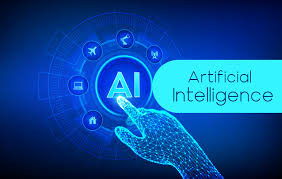Exploring the Future of AI Tech Innovations
The Rise of AI Technology
Artificial Intelligence (AI) technology has been transforming industries and reshaping the way we live and work. From personal assistants like Siri and Alexa to complex algorithms driving autonomous vehicles, AI is at the forefront of technological innovation.
What is AI Technology?
AI technology refers to the simulation of human intelligence in machines that are programmed to think and learn like humans. It encompasses various subfields such as machine learning, natural language processing, robotics, and computer vision. These technologies enable machines to perform tasks that typically require human intelligence.
Applications of AI
The applications of AI are vast and varied, impacting numerous sectors:
- Healthcare: AI is revolutionizing healthcare with predictive analytics for patient diagnosis, personalized medicine, and robotic surgery assistance.
- Finance: In finance, AI algorithms are used for fraud detection, risk management, and automated trading systems.
- Transportation: Self-driving cars are becoming a reality thanks to advancements in AI technology.
- Retail: Retailers leverage AI for personalized shopping experiences through recommendation engines and inventory management systems.
The Benefits of AI Technology
The integration of AI technology offers numerous benefits:
- Efficiency: Automation of repetitive tasks increases efficiency and allows humans to focus on more complex problems.
- Accuracy: Machine learning models can analyze large datasets with precision, reducing errors in decision-making processes.
- Innovation: AI fosters innovation by enabling new products and services that were previously unimaginable.
The Challenges Ahead
Despite its advantages, the rise of AI technology presents several challenges:
- Ethical Concerns: Issues such as privacy invasion, job displacement due to automation, and algorithmic bias need careful consideration.
- Lack of Transparency: Many AI systems operate as “black boxes,” making it difficult to understand how decisions are made.
- Security Risks: As with any technology, there are potential security risks associated with the misuse or hacking of AI systems.
The Future of AI Technology
The future of AI technology holds immense potential. As research continues to advance at a rapid pace, we can expect even more sophisticated applications across various domains. The key will be balancing innovation with ethical considerations to ensure that this powerful tool benefits society as a whole.
The journey into the world of artificial intelligence is just beginning. With continued collaboration between technologists, policymakers, and ethicists, the possibilities for improving our lives through intelligent machines are endless.
Understanding AI Technology: Key Questions and Insights
- What is artificial intelligence (AI) technology?
- How is AI technology being used in healthcare?
- What are the ethical concerns surrounding AI technology?
- Are there security risks associated with AI systems?
- How is AI impacting job markets and employment?
- What are the future trends and advancements expected in AI technology?
What is artificial intelligence (AI) technology?
Artificial Intelligence (AI) technology refers to the development of computer systems that can perform tasks typically requiring human intelligence. These tasks include understanding natural language, recognizing patterns, solving problems, and making decisions. AI encompasses a variety of subfields such as machine learning, where systems improve through experience; natural language processing, which enables machines to understand and respond to human language; and computer vision, allowing machines to interpret visual information. By simulating cognitive processes, AI technology aims to enhance efficiency and accuracy across numerous applications, from personal assistants like Siri and Alexa to autonomous vehicles and advanced data analytics in various industries.
How is AI technology being used in healthcare?
AI technology is revolutionizing healthcare by enhancing diagnostic accuracy, personalizing treatment plans, and improving patient outcomes. Machine learning algorithms analyze vast amounts of medical data to identify patterns and predict diseases at an early stage, allowing for timely intervention. AI-powered imaging tools assist radiologists in detecting anomalies in X-rays, MRIs, and CT scans with greater precision. Additionally, AI-driven virtual health assistants provide patients with 24/7 support, answering questions and managing appointments. In drug discovery, AI accelerates the process by identifying potential compounds faster than traditional methods. Overall, AI technology is making healthcare more efficient and accessible while paving the way for innovations that improve patient care.
What are the ethical concerns surrounding AI technology?
AI technology raises several ethical concerns that are crucial to address as its influence grows. One major issue is privacy, as AI systems often require vast amounts of data, leading to potential misuse or unauthorized access to personal information. Additionally, there is the risk of bias in AI algorithms, which can result in unfair treatment or discrimination if not properly managed. Job displacement due to automation is another concern, as AI can perform tasks traditionally done by humans, potentially leading to unemployment in certain sectors. Moreover, the lack of transparency in how AI systems make decisions creates challenges in accountability and trust. As AI continues to evolve, it is essential for developers and policymakers to consider these ethical implications and work towards solutions that promote fairness, transparency, and respect for individual rights.
Are there security risks associated with AI systems?
Yes, there are security risks associated with AI systems, and these concerns are becoming increasingly significant as AI technology continues to evolve. One major risk is the potential for adversarial attacks, where malicious actors manipulate input data to deceive AI models, leading to incorrect outputs or decisions. Additionally, AI systems can be vulnerable to data breaches, exposing sensitive information used in training datasets. There’s also the risk of AI being used for harmful purposes, such as automating cyber-attacks or creating deepfakes that spread misinformation. Ensuring robust security measures and ethical guidelines are in place is crucial to mitigating these risks and protecting both individuals and organizations from potential harm caused by compromised AI systems.
How is AI impacting job markets and employment?
AI is significantly impacting job markets and employment by automating routine tasks, leading to increased efficiency and productivity across various industries. While this automation can result in the displacement of certain jobs, particularly those involving repetitive or manual tasks, it also creates new opportunities in tech-driven roles such as data analysis, AI system development, and machine learning engineering. The demand for skills related to AI technology is rising, prompting a shift in workforce requirements toward more specialized expertise. As businesses adapt to these changes, there is a growing emphasis on reskilling and upskilling programs to equip workers with the necessary skills to thrive in an AI-enhanced economy. Ultimately, AI’s influence on employment will depend on how effectively industries manage this transition and support workers through educational initiatives and policy adjustments.
What are the future trends and advancements expected in AI technology?
The future of AI technology is poised for remarkable advancements and trends that promise to transform various aspects of society. One significant trend is the development of more sophisticated machine learning models, which will enhance AI’s ability to understand and process complex data. This will lead to more accurate predictive analytics and decision-making capabilities across industries such as healthcare, finance, and transportation. Additionally, the integration of AI with other emerging technologies like the Internet of Things (IoT) and 5G networks will enable smarter cities and more efficient infrastructures. Another anticipated advancement is in the realm of natural language processing, where AI systems will become even better at understanding and generating human-like text, facilitating improved communication between humans and machines. Furthermore, ethical AI development will gain importance as researchers focus on creating transparent and unbiased algorithms. Overall, these trends indicate a future where AI continues to drive innovation while addressing societal challenges responsibly.




